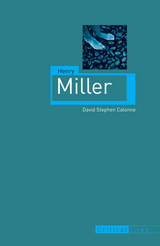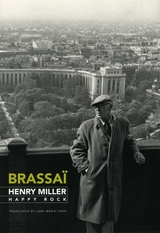
Charting Miller’s cultivation of his esoteric ideas from boyhood and adolescence to later in his career, Calonne examines how Miller remained deeply engaged with a variety of philosophies, from astrology and Gnosticism to Eastern thinkers. Calonne describes not only the effects this had on Miller’s work, but also to his complex and volatile life—his marriages and love affairs with Beatrice Wickens, June Mansfield, and Anaïs Nin; his years in Paris; and the journey to Greece that resulted in the travelogue The Colossus of Maroussi, the book Miller considered to be his greatest work. After discussing Miller’s final residences in Big Sur and the Pacific Palisades in California, Calonne considers the author’s involvement in the arts, love of painting and music, and friendships with a number of classical musicians. Miller, Calonne reveals, was a quirky, charismatic man of genius who continues to influence popular culture today.
Highlighting many areas of the author’s life that have previously been neglected, Henry Miller takes a fascinating revisionary approach to the work of one of American’s most controversial and iconic writers.

“In 1934 the city of Paris saw the birth of a book, published in English, which achieved instantaneous notoriety. Henry Miller’s Tropic of Cancer unfolded the adventures of a loquacious, free-wheeling, appallingly uninhibited American expatriate. But the rollicking eloquence, determined gusto, and explosive imagery of this modern Rabelais barely concealed the figure of a lonely American writer, thoroughly immersed in a legendary American situation.”—from the Introduction
Baxter examines Miller’s relationship with his native land and with Europe through his writings and in the comments of his critics and friends, navigating through the inconsistencies and the evolution of his opinions as his experiences changed. Her insights offer a complex, nuanced evaluation of Miller as writer and as expatriate.

That's Henry Miller's advice for young aspiring artists, as remembered by his very good friend Brassaï in this lively book. One of two that Brassaï wrote about the man who called himself a "happy rock," this volume covers their lives and friendship from the 1950s to 1973. Over the course of a number of warm, intimate conversations, Brassaï and Miller revisit their careers; discuss art, literature, Paris, Greece, Japan, World War II, and more; and consider the lives and works of many others in their circle, including Lawrence Durrell, Henri Matisse, Salvador Dalí, Georges Simenon, André Malraux, Hans Reichel, Paul Klee, and Amedeo Modigliani. Throughout Miller's zest for life shines through, as do his love of art and his passionate intensity for just about everything he does, from discussing a movie or play he'd just seen to reminiscing about a decades-long love.
Brassaï's Henry Miller, Happy Rock presents a vivid portrait of two close friends who thoroughly enjoy each other's company—and just happen to be world—famous artists too.
READERS
Browse our collection.
PUBLISHERS
See BiblioVault's publisher services.
STUDENT SERVICES
Files for college accessibility offices.
UChicago Accessibility Resources
home | accessibility | search | about | contact us
BiblioVault ® 2001 - 2024
The University of Chicago Press









